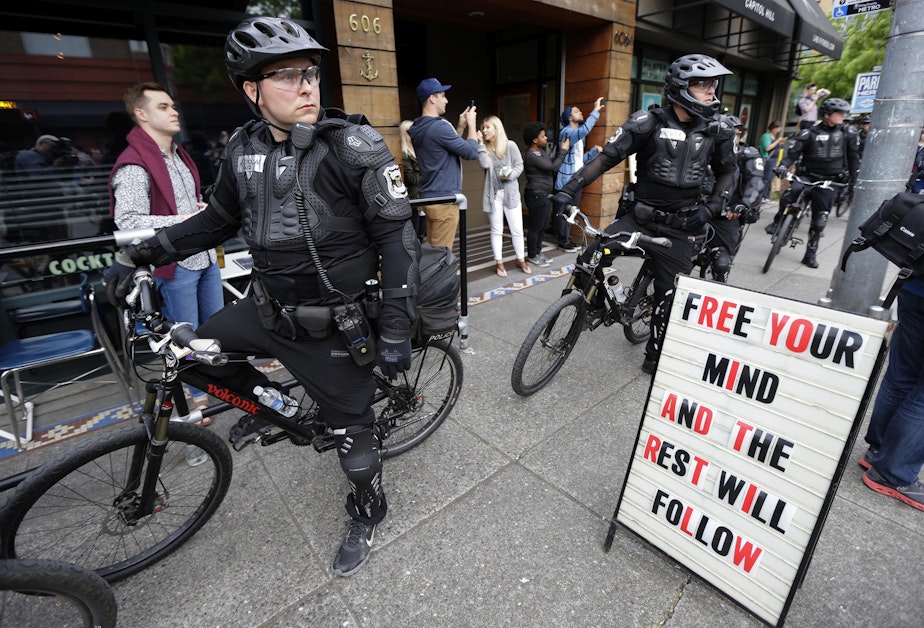Critics panned the city's proposed police contract. Here are six reasons why they want to reject it

After six years of moving through a court-ordered police reform process, last year Seattle passed police accountability legislation that was described as "historic" and "groundbreaking."
But the new law came with a caveat, pointed out by U.S. District Judge James Robart: the police union’s pending contract with the city. If the contract took away some of the reforms enshrined in the new law, it could "imperil" the city's police reform progress, Robart said.
Now that Mayor Jenny Durkan has submitted the new proposed contract with the Seattle police union to the City Council, critics say the proposed contract does roll back the progress legislated last year. Police union officials, however, say they made tough concessions, and the city got the process backwards.
Union officials say the hype over the new law was premature, because the process tried to circumvent their bargaining rights.
“Moving forward, I hope the city never attempts to legislate prior to bargaining,” Sergeant Rich O’Neill, lead negotiator for the Seattle Police Officers Guild, said.
Now the Community Police Commission is calling for the city to reject the contract, and the City Council has promised to carefully review it.
Sponsored
Here’s why some are concerned about the new contract, and what it means for Seattle’s ongoing police reform process in federal court.
1. The proposed contract could roll back reforms
The proposed police contract states that whenever there is a conflict between the new law and the collective bargaining agreement, the police union contract will prevail.
“Otherwise the contract is meaningless,” O’Neill said.
Critics like the Community Police Commission have pointed out that the proposal fails to include provisions of the new police accountability law, which means that the new law could be trumped by the union contract.
Sponsored
2. Critics see weakened oversight for police misconduct investigations
The police accountability law passed last May said that the Office of Police Accountability should have the authority to oversee criminal investigations of officers, not just wait for them to be completed by Seattle police.
But the proposed police union contract shifts that control back to the Chief of Police. It says that the Office of Police Accountability “will not direct or otherwise influence the conduct of the criminal investigation.”
SPOG’s O’Neill said the OPA Director was at the bargaining table during negotiations and “doesn’t want to do criminal investigations.” O’Neill noted that the proposed contract allows two new civilian investigators at OPA, displacing police sergeants. That concession “was not popular with our membership,” he said, yet they still voted overwhelmingly to ratify the contract.
3. No new subpoena power for police misconduct investigations
Sponsored
The new law gave the Office of Police Accountability and the newly formed Office of Inspector General the authority to issue a subpoena if evidence or testimony in a police misconduct case is not provided voluntarily by the officers. It’s a power advocates have been seeking for years.
Some other city agencies like the Office for Civil Rights already have this authority. But the proposed contract says those powers will “not be granted at this time” for police officers and their family members. O’Neill said it’s not clear these agencies have authority to issue subpoenas for administrative rather than criminal investigations.
4. More protections for officers accused of dishonesty
The new accountability law made it easier to fire police officers for findings of dishonesty. But the proposed contract creates a higher standard for disciplining officers for misconduct findings like dishonesty or anything that could be “stigmatizing” and make it difficult to get employment elsewhere.
5. Removes transparency measures
Sponsored
Back in 2014, Seattle police chief Harry Bailey overturned misconduct findings against several officers who had appealed their discipline. The reversals led to new scrutiny of SPD’s disciplinary system for being convoluted and outside public view.
The police accountability law said there should be a single route to the Public Safety Civil Service Commission, with all appeals open to the public.
But the proposed contract still allows for an appeal to go to a closed hearing before an arbitrator.
“Having these hearings open to the public was a bare bones improvement,” the Community Police Commission said. "And even that minor improvement has now been eliminated.”
The contract also allows complaint records to be destroyed after up to four years if findings aren’t sustained, and allows negotiation over subsequently removing records from personnel files.
Sponsored
6. Nothing changes for moonlighting officers
Last year, the city tried to clamp down on moonlighting, or “secondary employment,” by police officers, which was the subject of an FBI investigation. Mayor Tim Burgess signed an executive order and SPD posted new policies for off-hours work.
The new law says secondary employment should be overseen by an office of civilians within SPD. But the proposed contract says nothing will change for SPOG employees with after-hours gigs — and if the city wants to re-open this discussion then the union will ask for more compensation.
Judge Robart has set a Nov. 1 hearing to discuss the proposed agreement.





